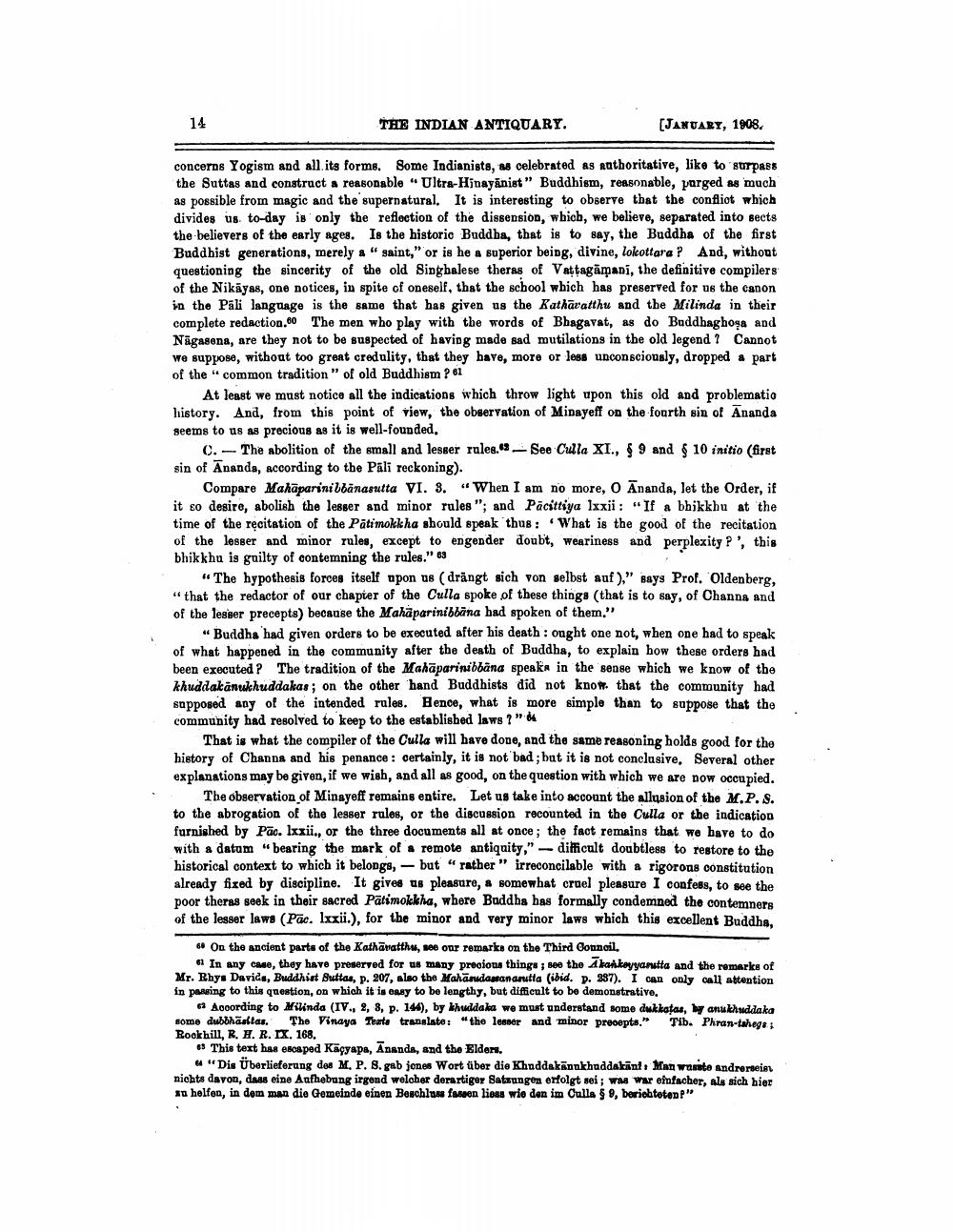________________
14
THE INDIAN ANTIQUARY.
[JANUARY, 1908.
concerns Yogism and all its forms. Some Indianists, as celebrated as authoritative, like to surpass the Suttas and construct a reasonable" Ultra-Hinayānist" Buddhism, reasonable, parged as much as possible from magic and the supernatural. It is interesting to observe that the conflict which divides us to-day is only the reflection of the dissension, which, we believe, separated into sects the believers of the early ages. Is the historic Buddha, that is to say, the Buddha of the first Buddhist generations, merely a " saint," or is he a superior being, divine, lokottara? And, without questioning the sincerity of the old Singhalese theras of Vaṭṭagamani, the definitive compilers of the Nikayas, one notices, in spite of oneself, that the school which has preserved for us the canon in the Pali language is the same that has given us the Kathavatthu and the Milinda in their complete redaction.60 The men who play with the words of Bhagavat, as do Buddhaghosa and Nagasena, are they not to be suspected of having made sad mutilations in the old legend? Cannot we suppose, without too great credulity, that they have, more or less unconsciously, dropped a part of the "common tradition" of old Buddhism ? 61
At least we must notice all the indications which throw light upon this old and problematic history. And, from this point of view, the observation of Minayeff on the fourth sin of Ananda seems to us as precious as it is well-founded.
C. The abolition of the small and lesser rules. See Culla XI., § 9 and § 10 initio (first sin of Ananda, according to the Pāli reckoning).
Compare Mahaparinibbānasutta VI. 3. "When I am no more, O Ananda, let the Order, if it so desire, abolish the lesser and minor rules"; and Pacittiya Ixxii: "If a bhikkhu at the time of the recitation of the Patimokkha should speak thus: What is the good of the recitation of the lesser and minor rules, except to engender doubt, weariness and perplexity ?', this bhikkhu is guilty of contemning the rules." 63
"The hypothesis forces itself upon us (drängt sich von selbst auf)," says Prof. Oldenberg, "that the redactor of our chapter of the Culla spoke of these things (that is to say, of Channa and of the lesser precepts) because the Mahaparinibbana had spoken of them."
"Buddha had given orders to be executed after his death: ought one not, when one had to speak of what happened in the community after the death of Buddha, to explain how these orders had been executed? The tradition of the Mahāparinibbana speaks in the sense which we know of the khuddakanukhuddakas; on the other hand Buddhists did not know that the community had supposed any of the intended rules. Hence, what is more simple than to suppose that the community had resolved to keep to the established laws?"
That is what the compiler of the Culla will have done, and the same reasoning holds good for the history of Channa and his penance: certainly, it is not bad; but it is not conclusive. Several other explanations may be given, if we wish, and all as good, on the question with which we are now occupied.
The observation of Minayeff remains entire. Let us take into account the allusion of the M.P. S. to the abrogation of the lesser rules, or the discussion recounted in the Culla or the indication furnished by Pac. lxxii., or the three documents all at once; the fact remains that we have to do with a datum "bearing the mark of a remote antiquity," difficult doubtless to restore to the historical context to which it belongs, but "rather" irreconcilable with a rigorous constitution already fixed by discipline. It gives us pleasure, a somewhat cruel pleasure I confess, to see the poor theras seek in their sacred Patimokkha, where Buddha has formally condemned the contemners of the lesser laws (Pac. lxxii.), for the minor and very minor laws which this excellent Buddha,
6 On the ancient parts of the Kathavatthu, see our remarks on the Third Connoil.
In any case, they have preserved for us many precious things; see the Akankeyyasutta and the remarks of Mr. Rhys Davids, Buddhist Buttas, p. 207, also the Mahasudassanasutta (ibid. p. 237). I can only call attention in passing to this question, on which it is easy to be lengthy, but difficult to be demonstrative.
62 According to Milinda (IV., 2, 8, p. 144), by khuddaka we must understand some dukkatas, by anukhuddaka some dubbhäsitas. The Vinaya Teats translate: "the lesser and minor precepts." Tib. Phran-tahege Rookhill, R. H. R. IX. 168.
es This text has escaped Kaçyapa, Ananda, and the Elders.
"Dis Überlieferung des M. P. S. gab jones Wort über die Khuddakännkhuddakant: Man wusste andrerseist nichts davon, dass eine Aufhebung irgend welcher derartiger Satzungen erfolgt sei; was war einfacher, als sich hier zu helfen, in dem man die Gemeinde einen Beschluss fassen liess wie den im Culla § 9, berichteten?"




